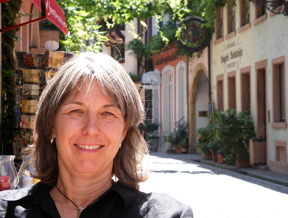If you don’t lose yourself, you might not ever find yourself, warns Heidi Wayment, a Northern Arizona University professor.
Wayment, who teaches positive psychology, is teaching her students some of the same techniques she uses in sports competition to help them become more competitive in life.
“I worry about today’s young generation not experiencing the feeling of being totally absorbed in anything. Many spend a great deal of time being social on internet outlets such as Facebook, and overall, this type of activity leads to a more harmful form of self-focus. It’s about ‘How do I look? How am I presenting myself?’ meanwhile these activities may take away from time they could use to extend and develop themselves,” Wayment says. “Part of the learning process required to do well in school and life is to have the kind of patience to get lost in the material. To learn to do this, students need to train their ability to focus.”
Wayment played professional women’s basketball for more than 20 years and recently joined a senior volleyball league made of retired semi-professional and professional athletes. She also coauthored the book, Transcending Self-interest: Psychological Explorations of the Quiet Ego.
“When I stand up by the volleyball net and get lost in the game, it’s like being out of time. I don’t know where I am or how old I am, I just know I am on the court. It is such a relaxing and wonderful feeling,” She says. “In competition and performance of any kind, the trick is not worry about how you are doing. The minute people start worrying about that, it interferes with their performance.”
She says to get into the flow of things, start minimizing self-talk. She has her students learn to quiet their ego by engaging in a hobby, developing a skill that satisfies them, reading for at least two-three hours at time and by spending enough time to get absorbed in something long enough to complete tasks or projects.
“Whether it’s for sports, a job, music or art, we tend to be more successful when we sort of lose ourselves,” she says. “Once you learn how to focus, you can adapt that experience to other situations.”
Wayment, who has taken informal surveys of her students, says the time students spend being creative or reading is “minuscule” compared to former generations.
“Technology and instant gratification that has been available to the younger generation since they were tiny and is causing a big cultural shift and attention spans are too quick,” she says. “It turns out that hobbies and creative activities are important for people’s sense of well being, but developing a skill is not going to happen fast, and that’s something I am trying to get across to my students.”
To help impart the notion of becoming absorbed in work, Wayment teaches “Flow,” a theory promoting success through learning how to savor the moment created by author and world-renowned psychologist Mihaly Csikszentmihalyi.



